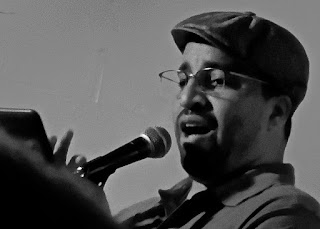 |
The Garden District, New Orleans.
Photos by Peter Rozovsky for
Detectives Beyond Borders |
Bouchercon 2016 was like no other in my experience, with more music, more color, more humidity, more good food, more courtesy, more good fellowship, more nobility of character, more drama, more hospitality, and more alligators than any I'd attended before. That's New Orleans and the bayou country, I guess.
My Thursday morning panel went as well as any I'd moderated. The panelists — Eric Beetner, Martin Edwards, Rick Ollerman, and Gary Phillips — were articulate, knowledgeable, and entertaining talking about their favorite crime writers of the past. Those crime writers included some I had previously read and enjoyed, including Charles Williams, Peter Rabe, and Michael Gilbert, and others new to me.
The latter included William Peter McGovern and the remarkable Clarence Cooper Jr. Ten minutes into the panel, Walter Mosley walked in and took a seat in the crowd. He even offered a trenchant and entertaining interjection during the session's question period. I have no photographic evidence of Mosley's presence, but you might be able to hear him on CDs and MP3 files of the session, available from
VW Tapes Conference Recordings.
 |
| Christa Faust |
The fun had begun the previous night, with the best Noir at the Bar I have attended since I invented Noir at the Bar eight years ago. The Voodoo Lounge on North Rampart Street was a perfect venue: crowded, amiably seedy, with a low, steady buzz of talk punctuating breaks between the superb readings.
The highlights for me? Martyn Waites and Christa Faust, who write violence and grotesquery, which anyone can do, but who do so with sympathy and heart, which few even try. John Rector's deadpan story, whose television food-show host character appears to cook something you'll never eat, was not just gross-out funny, but also superbly controlled. Johnny Shaw gave a hilarious reading-performance of a story featuring Chingón: The World’s Deadliest Mexican.
 |
Chris Acker and the Growing Boys. French
Quarter, New Orleans |
Sunday evening, two of us wandered the French Quarter, stopping in at bars or lingering in the street wherever the music sounded interesting. We heard funk and blues that brought home how important New Orleans was to the formation of rock and roll. We heard pure and clear country music from a sidewalk quartet whose audience included an 89-year-old woman who sang along to everything.
 |
Jay Stringer, Noir at the Bar's
apparently headless host |
But she couldn't top the blind man who walked into the first place we had stopped and danced up a storm using his impassive seeing-eye dog as a maypole. At one point in the evening a young man backing out of a doorway carrying an amplifier accidentally bumped my friend and said to her in a voice filled with concern: "Excuse me, sweetheart." That would not have happened in Philadelphia or Boston or Montreal or anywhere else I've ever been.
 |
Music in the French Quarter,
New Orleans |
Along the way we became separated from Ali Karim and Mike Stotter, much to Ali's consternation. But his anger had a benevolent cause: He had gone out of his way to help a fellow convention attendee who had got into trouble, and he was worried that the same had happened to us. Ali is a good human being as well as a hilarious boon companion.
New Orleans food you know about already. Suffice it to say that the spices will wake you up and that the best meal I had was the andouille-crusted fish at the Palace Café. Cajun music? Sone of the rhythms are tricky, but a lot of the songs are based on a simple I-IV-V chord progression that even I can play.
© Peter Rozovsky 2016Labels: Bouchercon, Bouchercon 2016, Christa Faust, Eric Beetner, Gary Phillips, Jay Stringer, John Rector, Johnny Shaw, Martin Edwards, Martyn Waites, New Orleans, Noir at the Bar, Rick Ollerman

























































